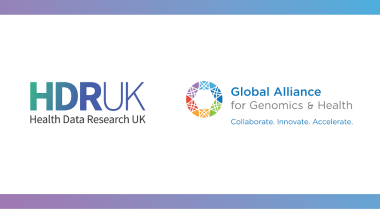UK Health Data Research Alliance calls for action to improve coding of ethnicity data
21 June 2023 | Author: Paola Quattroni, Head of Alliance Strategy and Engagement, HDR UK
In 2021, the UK Health Data Research Alliance established the Ethnicity Coding Working Group to tackle the challenges and explore opportunities in the use of data reporting ethnicity. Paola Quattroni, Head of Alliance Strategy and Engagement, discusses the progress that has been made over the last two years and the future for the group.
Over the last few years, the COVID-19 pandemic, scientific response and recent pressures on the healthcare system have put into sharp focus inequalities amongst certain subgroups in the UK.
Research delivered throughout the COVID-19 pandemic shows that ethnic minorities are disproportionally affected by COVID-19 including increased mortality and risk of complications.
Findings such as these have reinforced researchers’ belief that only high-quality, diverse health data can be used to understand disease, inform policies and improve health outcomes for the whole UK.
The Alliance Ethnicity Coding Standard Special Interest Group
The Special Interest Group on Ethnicity Coding Standards, a sub-group of the Alliance Diversity in Data working group, was set up to explore:
- Improvements to the way ethnicity data is collected in clinical settings
- Training for data collectors and healthcare professionals
- Improvements and priorities that can be evaluated within healthcare systems through the use of diverse data
- How well the population is represented in data-driven research
This group, chaired by Kamlesh Khunti and Ashley Akbari, brings together researchers, members of the Alliance, public and healthcare professionals to discuss challenges and opportunities in linking health and social care data with available ethnicity data, and the importance of collection practices and coding standards.
Discussions have highlighted the importance of transparency around the reasons for collecting ethnicity data, clarity in the use of terminology and definitions and building trust by engaging with ethnic minority groups.
While ethnicity coding standards exist for researchers, these are used inconsistently across the UK. Incomplete data, poor recording and missing data mean data cannot be used to its full potential.
There is also a need to compare data internationally, as highlighted during the pandemic, but it is a complex process as often ethnicity data is not collected in different countries, making it difficult to generate meaningful insights to benefit people at a global scale.
Kamlesh Khunti, Professor of Primary Care Diabetes and Vascular Medicine at the University of Leicester and Co-Chair HDR UK’s Ethnicity Coding Working Group, commented:
“Part of the challenge is collecting the correct data because without this, the overall picture we have at both a local and population health level is not complete. This is why the work undertaken at the Ethnicity Coding Workshop and the subsequent recommendations to standardise and increase the collection of relevant data is so important.”
Ashley Akbari. Associate Professor of Population Data Science at Swansea University and Co-Chair HDR UK’s Ethnicity Coding Working Group, said:
“Whilst there is a wealth of potential data sources available across the UK that contain ethnicity information, there is currently a lack of standardisation available in terms of the capture of these data, and also a gap in clarity around the way these data are collected, by who and with what guidance and direction being provided to patients and service users at the time of data capture.
Emerging recommendations for the collection of ethnicity data
In the past two years, several articles with new recommendations have been published alongside the formation of new groups to address issues around health inequalities and data.
However, no specific actions have yet been taken around standardising data collection practice. For example, although it is understood that healthcare professionals such as general practitioners (GPs) are key players in the system, there is no clear guidance, training or standard practice for this group around the recording of accurate and consistent ethnicity and personal data with ease while they perform their duty of delivering patient care.
Moreover, ethnicity information is mainly based on self-reporting – and the willingness of people to provide this information is key. Better communication on why personal information, such as ethnicity, is collected and the benefit to research might help people feel more confident about how their data is used.
Professor Khunti continues:
“Everyone deserves access to high-quality healthcare regardless of their background. We need to work harder and smarter to address inequalities, associated with ethnicity, in healthcare access and health outcomes.”
Professor Akbari continues:
“Providing more clarity through the whole pathway from the collection to management and use of data in the NHS and as part of research is a key priority of the Ethnicity working group to improve the quality and usefulness of these data in the future.”
Next steps and future work
In response to research findings and community insights, the Alliance, researchers and healthcare professionals are calling for action to improve data collection for more inclusive research.
The Ethnicity coding standards group has drafted a set of initial recommendations that could inform improvements in ethnicity data recording and drive better use of data for high-quality research (See draft recommendations).
An output report is being written in collaboration with members of group will consolidate these recommendations stressing:
- The need to record ethnicity data across all four UK nations consistently
- The need to reach an agreement around ethnicity data categorisations
- The duty to be transparent and communicate clearly about the reasons for collecting ethnicity
- The need to roll out standard guidance and/or training for data collectors in NHS and social care settings
- The importance of facilitating data linkage to enrich information available on ethnicity and associated information
- The importance of considering the inclusion of data for other protected characteristics
The final recommendations will be presented to relevant decision-makers for comment and the Alliance Council for endorsement.
We will continue to work with relevant groups who are already engaged in these discussions, such as the Centre for Ethnic Health Research, the NHS Race and Health Observatory, the Office for National Statistics, Understanding Patient Data, and the STANDING Together initiative among others who are actively working towards tackling health inequalities.
Moving forward, these recommendations will be an integral part of our partnership working to ensure everyone is included and benefits from health-data research.
Further reading:
- Ethnic differences in COVID-19 mortality during the first two waves of the Coronavirus Pandemic: a nationwide cohort study of 29 million adults in England
- Insights from Black & South Asian people on patient data
- The problem with ethnicity categories in UK health data
- Are some ethnic groups more vulnerable to COVID-19 than others?



